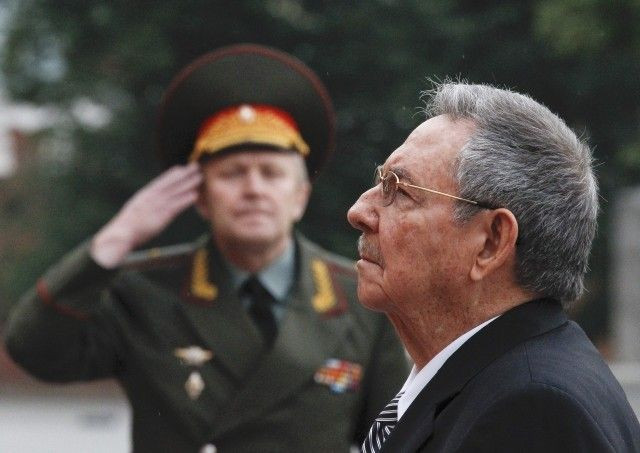Castro Ready For Talks With U.S.: Are Cuban-Americans Willing To Compromise?
ANALYSIS

Last week Cuban President Raul Castro said he was willing to engage the United States in talks in an apparent bid to relax more than five decades of diplomatic impasse.
"The table is set. If they want to discuss the problems of democracy, as they say, freedom of speech, human rights, the things they have invented for years, we will discuss them," Castro said last Thursday on the 59th anniversary of the July 26, 1953, attack that the Castros count as the start of the Cuban Revolution.
The U.S. officially ended diplomatic ties with Cuba when it shuttered its embassy in Havana in January 1961, two years after Fidel Castro came to power and several months after it implemented a full trade embargo on the island nation in response to the Cuban government's increasing nationalization of private enterprises.
Raul Castro has not set any specific preconditions for talks, though he emphasized that the U.S. would have to listen to his government's concerns about the very issues that Cuba has been criticized for.
"We are nobody's colony, nobody's puppet," Castro said.
The U.S., however, has made it clear that it expects Cuba to undergo extensive democratic reforms before it agrees to engage in talks.
"Our message is very clear to the Castro government," Assistant Secretary of State for Public Affairs Mike Hammer said in response to Castro's comments.
"They need to begin to allow for the political freedom of expression that the Cuban people demand, and we are prepared to discuss with them how this can be furthered."
Omar Lopez, director of human rights at the Cuban American National Foundation, an anti-Castro exile group, echoed Hammer's statements, adding that he felt Castro was hardly expressing a genuine desire to engage in constructive talks.
"You have to read his statements in context," Lopez said. "He used a lot of Cuban street language. When he said 'the table is set,' that means they are ready to fight and there is nothing else to talk about."
Lopez believes first and foremost, that Cubans must have expanded democratic freedoms, before any discussion of political reconciliation with the U.S. or a lifting of the embargo can occur.
A prime example is Cuba's lack of open elections. The state is under the sole rule of the Communist Party, whose succession of leadership is determined internally without any input from the public.
Cuba has been ruled by one family for more than 50 years. Fidel Castro reigned unchallenged from 1959 until 2011, whereupon he handed day-to-day power over to his younger brother Raul.
For many Cuban-Americans and Cuban immigrants who would like to see relations warm up between their homeland and the U.S., Raul Castro does not appear to be a willing partner in the process.
At the same time many of them are not necessarily looking for Castro to bring about substantial changes, but rather that the U.S. take the lead in normalizing relations.
According to recent polling data compiled by the Latin America Working Group, a majority of Cuban-Americans support the relaxation of a number of restrictions imposed by the U.S.
In a 2011 poll of Cuban-Americans in Miami-Dade County conducted by Florida International University, 57 percent of respondents said they supported a lift on all travel restrictions with the same number supporting the U.S. re-establishing diplomatic ties with Cuba.
Furthermore, 80 percent believed the U.S. embargo has either "not worked very well" or "not worked at all" in effecting political reforms in Cuba.
Mavis Anderson, senior associate at LAWG, explains these figures as a distinct shift among younger generations of Cuban-Americans for whom increasing contact with family members on the island is a priority, while older generations favor isolating the Castro regime above all.
Indeed, this is a sentiment that was reflected at the beginning of U.S. President Barack Obama's administration.
In 2009, Obama, by executive order, lifted travel restrictions for individuals visiting relatives in Cuba and allowed them to send remittances. This was followed up in 2011 by a lifting of travel restrictions for cultural, religious and academic groups.
These policies have been criticized particularly among politicians on the right, such as Sen. Marco Rubio. R-Fla., a Cuban-American and potential Republican vice presidential candidate, who maintains that there should be no softening of restrictions without political reform in Cuba.
Rubio, in a February 2011 Senate subcommittee hearing, questioned whether it was practical to allow Americans to travel to Cuba without being able to guarantee their safety.
But for many Cuban-Americans, safety is not the main concern. While maintaining contact with relatives may be a major factor in embracing the Obama administration's executive orders to lift some travel restrictions and allow limited remittances, it may also be an opening for some to support political opposition in Cuba.
"We are in favor of people-to-people contact," Lopez said. "It makes it easier to send aid and technical assistance to dissidents."
© Copyright IBTimes 2025. All rights reserved.





















